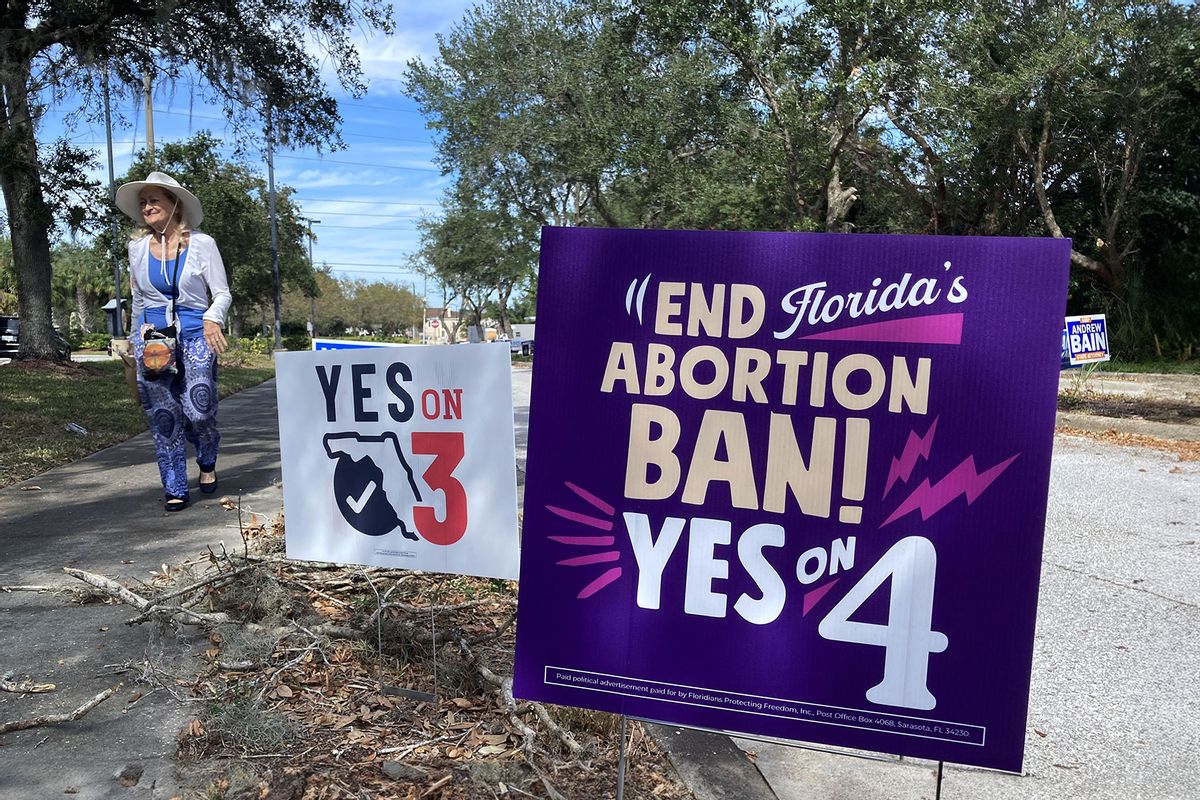This week, abortion was on the ballot in 10 states, but even in places where it wasn't, Democrats were hoping the fight for reproductive rights could give them an edge. The hope was to galvanize non-partisan voters to not only vote in favor of abortion access but also vote for the Democrats down the ticket. But once Donald Trump snagged the presidential spot again, with Republicans also taking the Senate majority, it became clear that while abortion access was prioritized in some red states, like Missouri and Montana, that didn’t render a blue victory.
Still, pro-abortion advocates aren’t necessarily calling Tuesday night an entire loss for reproductive rights in America. For example, Amendment 3 passed in Missouri, which will enshrine the right to an abortion in the state constitution, overturning the state’s current abortion ban. Missouri has one of the most restrictive abortion bans in the country where abortion is mostly entirely prohibited but only allowed "in cases of medical emergency.”
“Missouri has been labeled a ‘red’ state, but tonight’s results clearly demonstrate that abortion is not a partisan issue – it’s a personal health care issue that Missourians from every political background agree should be left to women, their families and their doctors,” Kelly Hall, executive director of the Fairness Project, which backed Missouri’s Yes on 3 campaign, said in a media statement.
Rachel Sweet, campaign manager of Missourians for Constitutional Freedom, the organization behind the Yes on 3 campaign, said Democrats, Republicans and independents “resoundingly declared that they don’t want politicians involved in their private medical decisions.”
"Floridians stand with abortion rights, but Governor DeSantis’ anti-democratic campaign against Amendment 4 has prevented the voices of his own constituents from being heard and enforced minority rule."
At the same time, Missouri voters picked Trump overall — who has bragged about overturning Roe v. Wade — instead of Kamala Harris, to be president. While the abortion ballot measure, Amendment 4, in Florida didn’t pass, a similar story unfolded. If passed, Amendment 4 would have amended the Florida state constitution to prohibit government interference with the right to abortion before viability. Florida’s post-Dobbs abortion law makes it a felony to perform or actively participate in an abortion six weeks after gestation. Technically, the ban has exceptions for rape, incest and human trafficking up to 15 weeks, and to save a woman’s life or prevent “substantial and irreversible” impairment. Fifty-eight percent of Florida voters wanted it to pass, but the measure required a 60 percent majority to pass — the highest threshold of all abortion amendments on the ballots. Notably, Trump grabbed 56 percent of the vote in Florida.
“Floridians stand with abortion rights, but Governor DeSantis’ anti-democratic campaign against Amendment 4 has prevented the voices of his own constituents from being heard and enforced minority rule,” Hall said. “In the face of the state government’s unrelenting interference with the ballot measure process, an extraordinary number of Florida voters stood up against a cruel and dangerous abortion ban – and we are incredibly proud to have supported the advocates on the ground who made that possible.”
Lauren Brenzel, campaign manager of Yes on 4 Florida, said the news confirmed what advocates observed on the ground during the campaign.
Want more health and science stories in your inbox? Subscribe to Salon's weekly newsletter Lab Notes.
“Florida’s deadly abortion ban is out of line with the values of our state,” Brenzel said. “Florida voters sent that message loud and clear today, and despite the fact that only a minority of voters voted to retain the abortion ban, our extremist government will exploit the situation to deny its own constituents the right to decide on our bodily autonomy.”
Other abortion measures failed to pass, including South Dakota’s Constitutional Amendment G. While it was seen as a more restrictive proposal than others — as it would have only enshrined rights in the state constitution for an abortion in the first trimester of pregnancy — the measure did not get a majority of the vote. In Nebraska, Initiative 434 passed, banning abortion after 12 weeks of pregnancy with limited exceptions. Its dueling initiative, which would have expanded abortion access, did not pass.
We need your help to stay independent
In Arizona, voters passed Proposition 139 amending the state constitution to provide a fundamental right to abortion. The measure is seen as a victory and will allow abortion after fetal viability to be accessible in cases to protect the life, physical or mental health of the pregnant woman. It also would prevent the state from penalizing anyone who assists another person in exercising their right to abortion. Earlier this year, the Arizona Supreme Court upheld an 1864 law that banned nearly all abortions in the state. After a protracted back-and-forth between courts, abortion remains accessible up to 15 weeks of pregnancy in the state.
Maryland, Montana, Colorado and Nevada all voted in favor of enshrining the right to abortion in their respective state constitutions. New York also passed a measure that will protect “against unequal treatment based on reproductive health care and autonomy.”
“Abortion access isn't just a winning issue with voters; it's a fundamental right that impacts every aspect of their lives,” Mini Timmaraju, Reproductive Freedom for All president and CEO, said in a statement. “This is a huge victory that reaffirms that voters across the political spectrum in red, blue and purple states will mobilize to protect their freedoms.”
Karla Gonzales Garcia, Gender, Sexuality and Identity Director with Amnesty International USA, called Arizona’s successful proposition a “win for human rights" in a media statement.
“Since the fall of Roe v. Wade, many states across the U.S. are facing a human rights crisis when it comes to abortion access that has created stigma, fear and lack of vital health care for far too many people,” Gonzales Garcia said. “But, with this vote, the people of Arizona have fought back and protected their human right to abortion.”



Shares